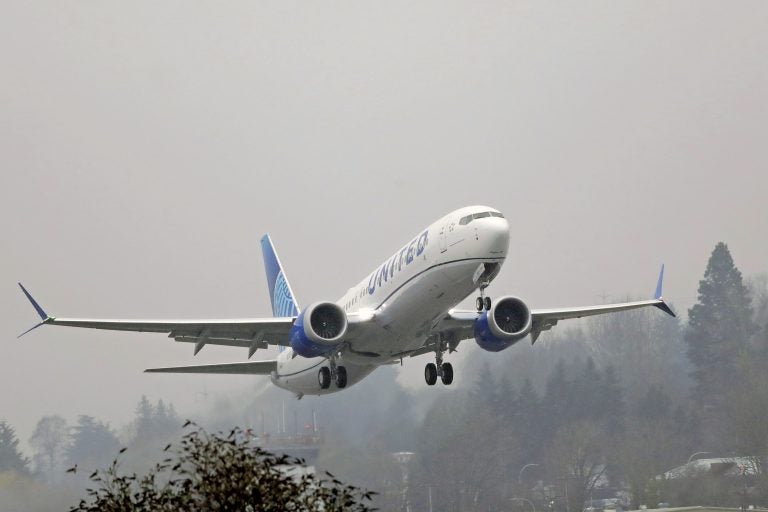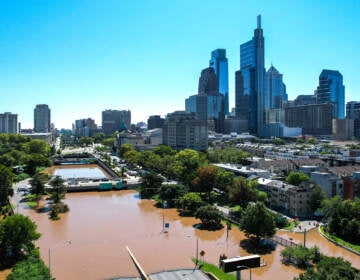What happens when academics fly less to conferences?
Sometimes, it means better conferences, as collaboration and access improve.
Listen 08:09
A United Airlines Boeing 737 Max airplane takes off in the rain. (Ted S. Warren/ AP Photo)
A few years ago, climate scientist Nadir Jeevanjee flew four to five times a year.
He had just gotten his Ph.D., so he had to present his work, find out what other people were working on, meet potential collaborators — which meant traveling to conferences.
One trip, he went to an earth scientists’ meeting in Vienna. But he had small children and didn’t want to be away for too long.
“It was a weeklong conference. I didn’t even go for the whole week, I think I stayed maybe three nights … made the flight out there, gave my 15-minute presentation, went out to dinner, went and saw some talks.”
On the way back, something didn’t feel right. Jeevanjee was struck “by the extravagance of it all: the expense of the travel, distance traveled, short time that I was there.”
He thought of the book Being the Change, by fellow climate scientist Peter Kalmus, about traveling slow, flying less to reduce carbon emissions but also to savor the journey.
The carbon footprint of flying can be as much as three times as doing the same trip by train. A researcher in Norway calculated the carbon footprint of scientists in his organization traveling for business: Just their business travel of 24 days produced more carbon dioxide than the global average of how much people produce in a whole year.
Jeevanjee pledged to fly less. For example, he skipped a conference in Greece because he could go next year, when the conference will be in the United States.
More academics like Jeevanjee are questioning their travel.
“It feels to me like a little bit of a tectonic shift, where the ground shifts in a somewhat profound way,” he said.
One of the people behind this movement is Parke Wilde, a food economist at Tufts University. He started a blog and a petition dedicated to getting academics to fly less. Roughly 600 academics and a handful of universities or associations have signed on.
“I can taste success, like I feel so strongly that we can achieve the changes that we need to achieve without sacrificing what is most essential,” Wilde said.
The goal is not to shame people for flying. The goal is for people to think carefully about flying, and for universities and professional associations to track and report the carbon footprint of flying.
“Colleagues will immediately start to think of the flights they’ve taken that were most important, either for their career or for the good that they do in the world,” Wilde said. “Here in the nutrition school at Tufts University, I have colleagues who work on international hunger issues, and some flight that they take may be involved in saving many lives. Clearly, that is not the flight to give up.”
Some academics also question whether one person can actually make a difference by giving up one flight. It’s not like the plane is going to stay on the ground just because some professors didn’t buy tickets.
Hannah Knox, an anthropologist at University College London, has thought about this a lot.
“It either falls into it being a matter of personal choice and an individual decision, or seen as not really relevant because what we should really be doing is looking at the structural changes that need to be made to society as a whole.”
Knox gave up flying for an entire year. Part of her research is about how scientists and activists reduce their carbon footprints. One of her questions is: Can individual action lead to a larger, and more meaningful, change?
One company certainly thinks it can, which has led to an unusual ad from the Dutch airline KLM, one of the world’s oldest, about “flying responsibly.” It asks people to maybe not fly because you could meet someone remotely, or use less carbon-intensive ways of transport.
Knox said that’s because KLM sees consumers changing their minds about flying and it wants to get ahead of it.
When people think about what to do about climate change, Knox said, they’ll sometimes look at the industries that produce the most carbon dioxide emissions, and think that’s what we should focus on. For example, people might see that aviation accounts for roughly 2 percent of all carbon dioxide emissions, and think, well, why not go after bigger targets and industries like farming.
“Everybody eats, but not everybody flies,” Knox said. “Our responsibility there is to really think hard about why we take for granted that it’s OK to get on a plane [even though] … the aviation industry at the moment [can’t] significantly reduce its carbon emissions.”
Scientists and people from all kinds of industries need to fly because of conferences. Some people have already worked on alternatives.
Anand Pandian, an anthropologist at Johns Hopkins University, organized a panel last November for a conference of the American Anthropological Association in Vancouver. Instead of people flying from across the world to be in the same room, he asked panelists to put up video presentations so people could watch and discuss online.
“Someone described it … as one of best binge-watching experiences in anthropology,” Pandian said.
For a previous conference, he also helped organize local watch parties so anthropologists could talk about the material with colleagues in their area.
Pandian said he did all this partly because of climate change, and partly because flying to conferences raises other barriers. Traveling to conferences is great if you have the money to fly, are able-bodied, and can afford to leave your family alone for a few days to meet your colleagues. But what about academics who can’t do that?
For example, one person attended the Vancouver panel remotely from Karachi, Pakistan, when they had never gone to this conference before and thought it would always be out of reach.
One of the panelists was an undocumented graduate student from Oregon State University who studies the conditions of undocumented migrants to the United States. He could not cross the border to present because the Trump administration wants to shut down DACA, an Obama-era program that granted temporary protections.
People watched that particular panel from all around the world, Pandian said, noting that lowering the barriers to conference travel is not only good for the climate, it could let more people have access to, share and create, knowledge.
WHYY is your source for fact-based, in-depth journalism and information. As a nonprofit organization, we rely on financial support from readers like you. Please give today.







